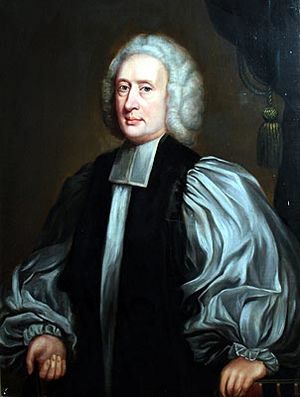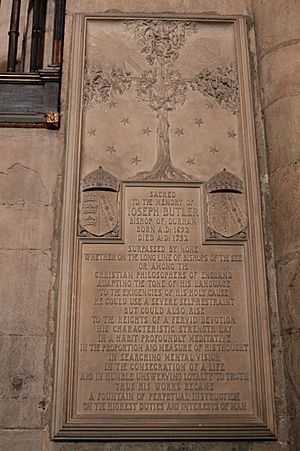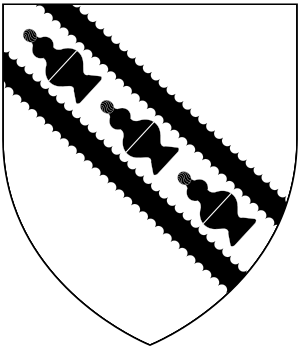Joseph Butler facts for kids
Quick facts for kids The Right Reverend Joseph Butler |
|
|---|---|
| Bishop of Durham | |
 |
|
| Diocese | Durham |
| In Office | 1750–1752 |
| Predecessor | Edward Chandler |
| Successor | Richard Trevor |
| Other posts | Bishop of Bristol (1738–1750) Dean of St Paul's (1740–1750) |
| Orders | |
| Ordination | 26 October 1718 (deacon) 21 December 1718 (priest) |
| Consecration | 3 December 1738 |
| Personal details | |
| Born | 18 May 1692 Wantage, Berkshire, England |
| Died | 16 June 1752 (aged 60) Bath, Somerset, Great Britain |
| Buried | 20 June 1752 (O.S.) Bristol Cathedral. |
| Nationality | English (later British) |
| Denomination | Presbyterian Anglican (after 1714) |
| Residence | Rosewell House, Kingsmead Square, Bath (at death) |
| Parents | Thomas Butler |
| Profession | Theologian, apologist, philosopher |
| Sainthood | |
| Feast day | 16 June (commemoration)
Philosophy career |
| Education | Tewkesbury Academy Oriel College, Oxford |
| Era | 18th-century philosophy |
| Region | Western philosophy |
| School | Empiricism, Christian philosophy |
|
Main interests
|
Theology |
|
Notable ideas
|
Criticism of deism Analogies of religion Circularity objection to Locke's account of personal identity |
|
Influences
|
|
|
Influenced
|
|
Joseph Butler (born May 18, 1692 – died June 16, 1752) was an important English Anglican bishop, religious thinker, and philosopher. He was born in Wantage, England. Butler is well-known for his ideas that challenged other popular beliefs of his time.
He questioned Deism, a belief that God created the world but doesn't interfere with it. He also disagreed with Thomas Hobbes's idea of egoism, which says people only act out of self-interest. Another area he explored was John Locke's theory about what makes someone the "same person" over time. Many famous thinkers, like David Hume and Adam Smith, were influenced by Butler's ideas. He is often called one of the most important English moral thinkers.
Contents
Biography
Early Life and Education
Joseph Butler was born on May 18, 1692. His father was a linen seller and a Presbyterian, a type of Christian church. Joseph was expected to become a minister in the Presbyterian church. He went to a special school called a dissenting academy in Gloucester.
While there, he secretly wrote letters to Samuel Clarke, an Anglican theologian. In 1714, Butler decided to join the Church of England. He then went to Oriel College, Oxford. He earned his first degree in 1718 and later became a Doctor of Civil Law in 1733.
Church Career and Roles
Butler became a deacon on October 26, 1718. This was a first step in becoming a priest. He was ordained as a priest on December 21, 1718. Both ordinations were done by William Talbot, who was the Bishop of Salisbury.
After holding several important church jobs, Butler became the rector of a wealthy church in Stanhope, County Durham. In 1736, he became the main chaplain to Queen Caroline, the wife of King George II.
He was chosen to be the Bishop of Bristol on October 19, 1738. He officially became a bishop on December 3, 1738. While still Bishop of Bristol, he also became the Dean of St Paul's in London in 1740. He held this important position until he moved to a new role.
It is said that he turned down the chance to become the Archbishop of Canterbury in 1747. However, he did serve as a special advisor to the King from 1746 to 1752. In October 1750, he became the Bishop of Durham, which was a very important position. He was buried in Bristol Cathedral.
Death and Lasting Impact
Joseph Butler passed away in 1752 in Bath, England. People who admired him said he was a good person. They also noted he was a hardworking and careful church leader. Even though he wasn't very interested in literature, he enjoyed art, especially architecture.
The Church of England remembers Joseph Butler on June 16 each year. This day is a special commemoration of his life and work.
Philosophy

Challenging Deism
During his life, Butler was most famous for his book, Analogy of Religion, Natural and Revealed (1736). This book was seen as a strong defense of Christian beliefs. At the time, many thinkers called deists believed that nature showed evidence of a creator. However, they did not believe in miracles or some parts of the Bible.
Butler's Analogy was a response to these deists. He argued that nature itself has mysteries and things that seem difficult to understand. He said that if nature is full of riddles, then religious teachings might also be unclear sometimes. He used "analogies," or comparisons, between nature and Christian beliefs. He suggested these comparisons made Christian teachings seem more likely to be true.
Today, Butler's Analogy is mostly studied for its historical importance. One part that is still widely read is his criticism of John Locke's ideas about personal identity.
Ideas on Ethics and Human Nature
Joseph Butler's ideas had a big impact on moral philosophy in the 1800s. In his Sermons, Butler mainly challenged the ideas of Thomas Hobbes. Hobbes believed that humans are naturally selfish and only seek power. He thought that all human choices came from the strongest desire at a given moment.
Butler argued that human motivation is more complex than Hobbes suggested. He believed that the human mind has different parts and impulses. Many of these impulses are not selfish at all. He said that basic feelings like hunger, anger, and sympathy are controlled by two higher principles:
- Self-love: The desire to be happy in the long run.
- Benevolence: The desire to help others and make everyone happy.
These higher principles are then guided by the most important part of the mind: the moral conscience. Butler believed that conscience is an inborn sense of right and wrong. It's like an inner guide from God. Conscience tells people to work for both general happiness and their own happiness. Butler argued that these two goals usually go together. He believed that selfish people are often not truly happy.
He also thought that perfect fairness, where good people are always rewarded and bad people punished, is guaranteed by God in the afterlife.
Critique of Locke's Personal Identity Theory
In an appendix to his Analogy, Butler offered a famous critique of John Locke's theory of "personal identity." Locke tried to explain what makes someone the "same person" over time. This is tricky because our bodies and minds change constantly. Locke believed that personal identity comes from having the same consciousness and memory. He said memory is what connects different stages of our lives.
Butler disagreed with this idea. He argued that to know if a memory is real, you must first know that you are the person who had that experience. So, Butler said, memory already assumes you are the same person. Therefore, memory cannot be the reason for personal identity itself. This part of Butler's work is still studied today.
Veneration
Joseph Butler is honored in the liturgical calendar of the Episcopal Church (USA) on June 16.
See also
 In Spanish: Joseph Butler para niños
In Spanish: Joseph Butler para niños
- Altruism
- Christian philosophy
- Deism


